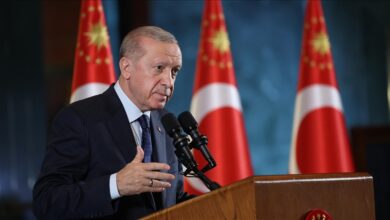
Experts: The Assad regime has used chemical weapons at least 17 times in Syria
The head of the Organization for the Prohibition of Chemical Weapons, Fernando Arias, said: “The Assad regime has used chemical weapons at least 17 times since 2011 until now.”
According to what was reported by the Associated Press, Arias said: “The organization’s experts investigated 77 allegations against the Assad regime, and concluded that the regime used them 17 times,” describing this as a “worrying fact” that comes eight years after the Assad regime’s accession to the Organization for the Prohibition of Chemical Weapons in 2013.
The head of the Organization for the Prohibition of Chemical Weapons explained that there are still many questions about the credibility of the Assad regime regarding the announcement of its chemical weapons program and its stockpile of those weapons, noting that he will raise with the regime the issue of finding chemical weapons in samples collected from large storage containers in September 2020.
Arias pointed out that the Assad regime ignored two times the request for entry visas in order to send an investigation team last May, adding: “I decided to postpone the mission until further notice.”
On April 21, the members of the Organization for the Prohibition of Chemical Weapons voted by a majority, in favor of a resolution stripping the Assad regime of its privileges, including the right to vote in the organization, after confirming its responsibility for the use of poison gases in its war against civilians, and the resolution was adopted by 87 votes out of 136 Russia and 14 other countries opposed it.
On the 6th of the same month, Izumi Nakamitsu confirmed, during a Security Council session on the chemical weapons program in Syria, that the Assad regime’s announcement of ending its chemical program was “inaccurate and incomplete.”
The United Nations says that the Assad regime has so far refused to answer several questions related to the manufacture and stockpiling of chemical weapons, and to provide sufficient information that would enable the Organization for the Prohibition of Chemical Weapons to close the file on the finding of chemicals inside Syria.
On September 27, 2013, the UN Security Council adopted Resolution No. 2118, regarding the disarmament of chemical weapons from Syria, in which it referred to the possibility of imposing sanctions and the use of force in the event of chemical attacks in Syria by any party, and the decision came after the exposure of Eastern Ghouta and Muadamiyat al-Sham in Ghouta On August 21, 2013, the western city of Damascus was attacked by missiles carrying sarin and nerve gas, in which more than 1,450 people were killed, most of them children.
Against the background of the decision, Moscow pressured the Assad regime to join the Organization for the Prohibition of Chemical Weapons, and in 2014 the regime claimed to have destroyed all its stockpiles of chemical weapons.
On April 8, 2020, the Organization for the Prohibition of Chemical Weapons accused – for the first time – the Assad regime of using chemical weapons three times during March 2017 in “Al-Lataminah” in the Hama countryside. Following the report, international and UN calls were issued to hold accountable all those responsible for the use of chemical weapons in Syria.




